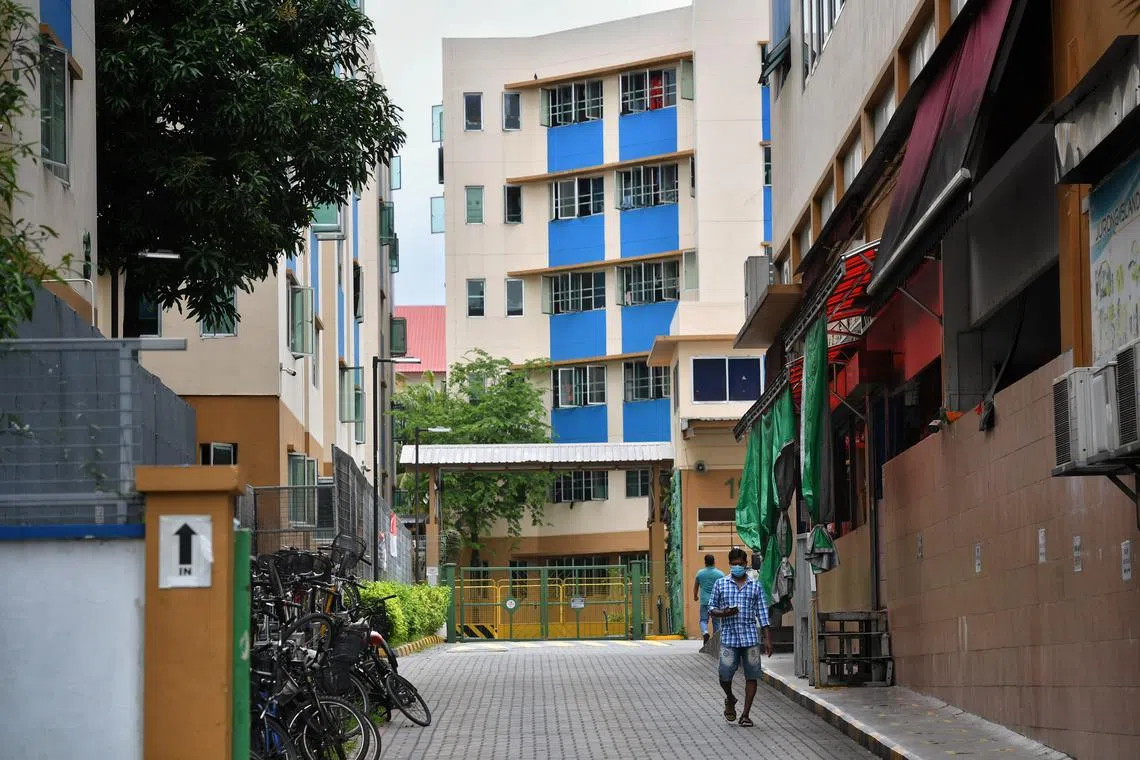Govt to announce plan for existing dorms to meet improved standards later in 2023: Tan See Leng
Sign up now: Get ST's newsletters delivered to your inbox

Despite MOM’s move to raise living standards, anecdotes show that there is still uneven enforcement for smaller dormitories.
PHOTO: ST FILE
Follow topic:
SINGAPORE – The details of a plan to support the retrofitting of existing worker dormitories to meet higher standards of living will be announced later in 2023, after almost two years of deliberations and discussions.
Manpower Minister Tan See Leng said on Monday that this transition plan by the authorities will take into account what existing infrastructure can support, the potential disruption to bed supply, which is already tight, and the impact on the inflow of workers.
He was responding to MPs who had asked for a firmer timeline on when worker dorms nationwide will meet the higher standards, which include a cap of 12 residents in each room instead of 15 now, mandatory en-suite toilets, a larger living space per resident and better ventilation.
Announced in September 2021,
Speaking during the debate on Singapore’s response to the Covid-19 pandemic, Workers’ Party MP Leon Perera (Aljunied GRC) said the outbreaks at migrant worker dormitories
Despite MOM’s move to raise standards of living, anecdotes from migrant workers on the ground show that there is still uneven enforcement for smaller dormitories, Mr Perera said.
Ms Rachel Ong (West Coast GRC) raised similar concerns about poor conditions in smaller factory-converted dorms (FCDs), which house about a third of the more than 300,000 dorm residents here.
Noting how non-governmental organisations had to step in to help workers living in FCDs who were left to fend for themselves in the early days of the pandemic, Ms Ong asked if employers who left workers in the lurch would be held accountable.
Mr Louis Ng (Nee Soon GRC) said: “We reviewed dormitory conditions and decided 3.5 sq m per person and 15 residents to a common toilet is unacceptable. We cannot say these standards are unacceptable for some, but continue to live with these standards for others.”
In response, Dr Tan said the Government recognises that more needs to be done to raise living standards at worker dorms.
He pointed to the creation of Nest Singapore, a new corporate entity by MOM that will operate two new purpose-built dorms in partnership with the private sector. The two dorms will be built and owned by MOM, and they are slated to open in 2025 and 2028.
The authorities will also continue to strengthen regulations governing dormitory operators, he added.
From April, about 1,500 dorms will come under the Foreign Employee Dormitories Act
This will give MOM more options to take action against errant dorm operators, including directives for lapses to be rectified and orders prohibiting new tenants to be taken in until shortcomings are fixed.
“These initiatives to enhance the standards of the living environment of our migrant workers will transform the features of the migrant worker landscape,” Dr Tan said.
Other structural reforms have also been made to improve healthcare for the migrant worker community and boost mental well-being, which took a hit due to prolonged restrictions that were fully lifted only in March 2023.
A new primary healthcare system comprising 10 dedicated medical centres and a network of partner private clinics have been set up, and employers are required to buy primary care plans for migrant workers living in dorms, as well as those in the construction, marine and process sectors.
Dr Tan said the Assurance, Care and Engagement Group (Ace)
Ace, a permanent unit under MOM, will have the capability to respond quickly in a future pandemic, he added.
Dr Tan noted that a new feature was added to the FWMOMCare app in end-2022, so migrant workers can request to talk to MOM directly and seek help when they face a problem. The ministry developed the app in 2020 to monitor the health of migrant workers.
A White Paper on Singapore’s response to the pandemic has highlighted the handling of the Covid-19 outbreak in worker dormitories as a key area where the Government could have done much better.
About half of the 300,000 migrant workers in dorms were estimated to have contracted Covid-19 by the time lockdowns were lifted in August 2020. While the vast majority had mild or asymptomatic infections, two died as a result of Covid-19.
Dr Tan said the Government’s measures at every step were guided by science and the latest evidence available at the time.
“We knew that the dormitory lockdown put the migrant workers under stress and strain, but if we had not done so, the transmission among migrant workers across the dormitories and into the community would have been much more severe and widespread,” he added.
After vaccines became available, more than nine in 10 workers living in dormitories were fully vaccinated against Covid-19 in less than six months.
This made a difference when the highly transmissible Delta variant struck in mid-2021, with no other migrant workers living in dorms dying due to Covid-19, Dr Tan said.
Taking stock of the past three years, he said the authorities could have done more surveillance through sample testing of different migrant worker populations in order to detect clusters early.
“Masks were very scarce at the start, but we could have ensured some form of masks or protective covering was worn by migrant workers to reduce the incidence of transmissions,” he added.
The Government could also have communicated better with the dormitory workers “in the fog of war”.
“MOM will learn from these lessons, and we will strive to do better in the future,” he said.
Correction note: An earlier version of this story said Nest Singapore will build and own two new purpose-built dormitories. This is incorrect. The two dorms will be built and owned by MOM. Nest Singapore will operate them in partnership with the private sector. We are sorry for the error.


